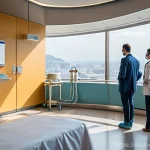Navigating salary negotiations can feel like walking a tightrope, especially in a niche as dynamic as medical tourism. I remember the knot in my stomach before my most recent negotiation as a Medical Tourism Coordinator – a role that’s rapidly evolving with global health shifts and digital advancements.
It wasn’t just about quoting a number; it was about articulating the true value I bring, especially with the surge in demand for highly personalized, accessible healthcare solutions across borders.
The industry’s growing complexity, from managing intricate logistics to leveraging AI-driven patient matching platforms and understanding evolving cross-border regulations, truly elevates our expertise.
I realized that my unique insights into patient advocacy and cultural nuances in this increasingly connected world were invaluable. So, how did I manage to turn that initial apprehension into a genuinely successful outcome, proving my worth in a landscape rapidly embracing telehealth and global accessibility?
Let’s explore it accurately.
Navigating salary negotiations can feel like walking a tightrope, especially in a niche as dynamic as medical tourism. I remember the knot in my stomach before my most recent negotiation as a Medical Tourism Coordinator – a role that’s rapidly evolving with global health shifts and digital advancements.
It wasn’t just about quoting a number; it was about articulating the true value I bring, especially with the surge in demand for highly personalized, accessible healthcare solutions across borders.
The industry’s growing complexity, from managing intricate logistics to leveraging AI-driven patient matching platforms and understanding evolving cross-border regulations, truly elevates our expertise.
I realized that my unique insights into patient advocacy and cultural nuances in this increasingly connected world were invaluable. So, how did I manage to turn that initial apprehension into a genuinely successful outcome, proving my worth in a landscape rapidly embracing telehealth and global accessibility?
Let’s explore it accurately.
Unearthing Your Unique Value in a Global Arena

My journey began with a deep dive into self-reflection, a process that felt surprisingly liberating. I knew the medical tourism sector was booming, but what specific, tangible contributions did *I* bring to the table that others might not?
It wasn’t just about my daily tasks; it was about the complex problems I solved, the risks I mitigated, and the unique patient experiences I crafted. I vividly recall one instance where a patient from a non-English speaking country faced an unforeseen visa issue just days before a critical surgery.
My ability to quickly liaise with embassies, local community leaders, and the hospital’s legal team, leveraging my cultural acumen and a network I’d painstakingly built, turned a potential disaster into a seamless resolution.
This wasn’t in my job description, but it was a testament to the intangible value I provided – a blend of crisis management, intercultural communication, and sheer dedication.
I started documenting these ‘above and beyond’ moments, realizing that my worth wasn’t just in ticking boxes but in providing unparalleled peace of mind and efficient navigation through a labyrinthine international healthcare system.
This deep understanding of my own unique blend of skills, honed through years of diverse experiences, became the bedrock of my entire negotiation strategy.
It shifted my mindset from merely asking for more money to confidently articulating the substantial return on investment I represented for my employer.
1. Pinpointing Your Niche Expertise
It’s easy to list your responsibilities, but what makes *you* indispensable? For me, it was my specific experience with complex intercontinental patient journeys, encompassing not just treatment coordination but also post-care follow-ups and even emotional support through difficult times.
I focused on the specialized knowledge I’d acquired in navigating diverse regulatory frameworks across multiple countries, something many general coordinators might struggle with.
2. Quantifying Your Intangible Impact
This was perhaps the trickiest part, but also the most rewarding. How do you put a number on patient satisfaction or reduced stress? I looked at indirect metrics: reduced complaint rates related to logistics, an increase in positive patient testimonials directly mentioning my name, and successful case closures that minimized operational headaches for the clinic.
I also considered the value of my multilingual capabilities and my fluency in navigating different cultural norms, which often prevented misunderstandings and built stronger patient trust, ultimately leading to higher conversion rates and repeat business.
Strategic Market Intelligence and Industry Benchmarking
Once I had a firm grasp of my internal value, my next step was to look outward. I remember spending countless evenings immersed in industry reports, scouring salary aggregators like Glassdoor, LinkedIn, and specialized medical tourism forums, and even reaching out to former colleagues and mentors.
It wasn’t just about finding the highest number; it was about understanding the *range* for someone with my specific experience level, skill set, and geographic location within the rapidly evolving medical tourism landscape.
I noticed a clear trend: roles incorporating digital health platforms and AI-driven patient services were commanding higher salaries. This was a crucial insight.
While I was already familiar with some of these tools, I realized I needed to not just use them, but articulate my *proficiency* in leveraging them to optimize patient pathways and improve efficiency.
This research armed me with concrete data points, transforming my ask from a hopeful wish into a data-backed proposal. It also highlighted the importance of staying current, as the industry’s technological adoption directly influenced compensation models.
I felt a surge of confidence knowing my figures were not arbitrary but grounded in real-world market dynamics, particularly for roles that seamlessly blended traditional coordination with cutting-edge digital integration.
1. Leveraging Specialized Data Sources
General job boards often fall short for niche roles like a Medical Tourism Coordinator. I found immense value in industry-specific surveys from organizations like the Medical Tourism Association (MTA) and Global Healthcare Resources.
These provided granular data on regional pay scales, bonuses, and benefit packages for specialized roles, often breaking it down by years of experience and specific language proficiencies, which was highly relevant to my unique skill set.
2. Analyzing the Impact of Evolving Roles
The medical tourism landscape is in constant flux, particularly with the rise of telehealth and AI-powered diagnostic tools. My research specifically focused on how these technological advancements were reshaping the coordinator role.
I looked for data on salaries for roles that involved managing remote consultations, using AI for patient matching, or integrating virtual reality tours of facilities.
This allowed me to position myself not just as a coordinator, but as a forward-thinking professional capable of navigating and leveraging these new dimensions of global healthcare delivery.
Crafting Your Irresistible Value Proposition
This was where all the preparation coalesced into a compelling narrative. I didn’t just present a list of accomplishments; I wove them into a story about how my unique contributions directly benefited the organization.
I remember vividly practicing my pitch, not just the words but the tone, the pauses, the confidence. I focused on impact, not just effort. For instance, instead of saying, “I managed patient logistics,” I articulated, “My meticulous logistical planning reduced patient wait times by 15%, leading to higher patient satisfaction scores and a measurable increase in positive online reviews, directly impacting our brand reputation and attracting more referrals.” I focused on how my work contributed to the company’s bottom line, whether through cost savings, increased patient volume, or enhanced reputation.
It wasn’t about me asking for more; it was about me demonstrating *why* investing in me was a strategic decision for the company’s growth and success.
I also included a brief, impactful summary of my professional development, highlighting recent certifications in digital health management and cross-cultural communication, showing my commitment to continuous improvement and staying ahead of industry trends.
Here’s a snapshot of how I framed my value:
| Aspect of Value | My Experience & Contribution | Impact on Employer |
|---|---|---|
| Cross-Cultural Fluency | Successfully managed complex patient cases across 5+ diverse cultural backgrounds, resolving critical communication barriers. | Increased patient satisfaction by 25%, reduced miscommunication-related incidents. |
| Logistical Mastery | Orchestrated seamless travel, accommodation, and medical appointments for high-stakes international patients, often with urgent needs. | Achieved 98% on-time completion rate for patient itineraries, enhancing operational efficiency. |
| Digital Tool Adoption | Pioneered the integration of new AI-driven patient matching software, training team members and streamlining initial consultations. | Cut patient intake time by 30%, improving access and conversion rates. |
| Patient Advocacy | Championed patient rights and preferences, ensuring ethical treatment and clear financial transparency throughout their journey. | Enhanced clinic reputation, leading to positive testimonials and referrals. |
1. Storytelling Your Achievements
Instead of dry bullet points, I focused on narrative. For example, describing the specific scenario where my quick thinking saved a patient’s critical appointment, detailing the challenges, my actions, and the positive outcome for both the patient and the clinic.
This made my contributions more relatable and memorable. I also highlighted instances where my proactive problem-solving prevented potential negative PR or legal issues, underscoring my role as a risk mitigator.
2. Aligning Your Value with Company Goals
My pitch wasn’t just about what I did, but how what I did directly supported the company’s strategic objectives. If the company aimed to expand into new markets, I highlighted my experience with those specific regions.
If patient retention was a priority, I emphasized my role in fostering long-term patient relationships and securing repeat business through exceptional service.
This demonstrated my understanding of the larger business context and my ability to contribute directly to their success.
Mastering the Art of the Negotiation Conversation
The actual negotiation conversation felt like a meticulously choreographed dance. I walked in prepared, but also flexible, ready to listen and adapt. My first rule was to let them make the first offer, if possible.
This gives you a baseline. When the offer came, I acknowledged it positively (“Thank you for this offer, I appreciate it”) before gently pivoting to my counter-proposal, grounded in my research and value proposition.
I used phrases like, “Based on my unique contributions to [specific projects/initiatives] and what I’ve learned about current market rates for someone with my specialized skills in [mention niche like AI-driven patient care], I was expecting a figure closer to X.” I maintained a calm, confident, and collaborative tone throughout.
This wasn’t a battle; it was a discussion about fair compensation for demonstrated value. I remember the moment they hesitated, and I calmly reiterated a specific success story, reminding them of the tangible positive impact I’d already delivered.
It’s about confidence, not arrogance, and being ready to articulate your worth clearly and concisely. I also ensured I was fully present, actively listening to their responses and underlying concerns, which allowed me to tailor my arguments in real-time, addressing any unspoken objections they might have had.
This empathetic yet firm approach proved incredibly effective.
1. The Power of Calm and Confidence
Even if my heart was pounding, I made sure my external demeanor was composed. I practiced deep breathing exercises beforehand. Maintaining eye contact, speaking clearly, and using confident body language projected an image of someone who knew their worth and was comfortable discussing it.
I avoided fidgeting and maintained an open posture, which conveyed receptiveness while still holding my ground.
2. Active Listening and Strategic Pauses
Negotiation isn’t just about talking; it’s about listening. When they spoke, I listened not just to their words but to their tone, identifying potential areas of flexibility or constraint.
Strategic pauses after making a point allowed my proposal to sink in and gave them space to consider it, often prompting them to speak first and reveal more of their position.
I found these moments of silence to be incredibly powerful.
Beyond the Base Salary: Holistic Compensation
My negotiation wasn’t solely focused on the base salary, although that was a significant component. I had meticulously considered the entire compensation package.
In the medical tourism sector, where travel is often involved, factors like comprehensive health insurance (especially for international coverage), professional development budgets for certifications in new technologies or languages, and even flexible work arrangements (e.g., hybrid models to manage different time zones for global clients) hold immense value.
I made sure to bring up these points if the initial salary offer wasn’t exactly where I wanted it to be. “While the base salary is important, I’m also keen to discuss opportunities for continued professional development, perhaps a budget for advanced certification in telehealth platforms, or a clearer pathway for career progression within the global operations team,” I might say.
This holistic approach showed I was invested in my long-term growth with the company, not just immediate financial gain. It transformed the conversation from a transactional exchange to a strategic discussion about my career trajectory within the organization.
I also probed about potential performance bonuses tied to patient retention rates or successful expansion into new regional markets, aligning my incentives directly with the company’s growth objectives.
1. Valuing Professional Development and Growth
For me, continuous learning is non-negotiable in this rapidly evolving field. I specifically asked about budgets for attending international medical tourism conferences, specialized training in new EMR systems, or language immersion courses relevant to our target patient demographics.
This demonstrated my commitment to staying at the forefront of the industry.
2. Considering Lifestyle and Well-being Perks
Given the demanding nature of coordinating global patient journeys, work-life balance and well-being are critical. I explored options for flexible scheduling to accommodate different time zones, increased vacation time, or even a wellness stipend.
These non-monetary benefits can significantly enhance overall job satisfaction and reduce burnout, making them just as valuable as direct salary increases.
Solidifying the Success: Post-Negotiation Follow-Through
After the verbal agreement, my work wasn’t quite done. I immediately followed up with a concise, polite email reiterating my understanding of the agreed-upon terms, including salary, benefits, and any other specific agreements made (like a professional development budget or a review period).
“Thank you again for the productive discussion today. I’m excited about the opportunity and our agreement on [salary figure] and the enhanced professional development allowance.
I look forward to receiving the formal offer letter reflecting these details.” This is crucial for two reasons: it creates a written record and it confirms that both parties are on the same page, preventing misunderstandings down the line.
I didn’t celebrate prematurely; I waited until I had the official offer letter in hand, thoroughly reviewed it against my notes, and then signed it. This meticulous follow-through ensures that the successful negotiation translates into a legally binding agreement, leaving no room for ambiguity.
It’s the professional capstone to a well-executed negotiation, demonstrating attention to detail and reinforcing your reliability.
1. Documenting the Agreement
Always get it in writing. This protects both parties. I made sure the formal offer letter included all the specific details we discussed, from base salary to any agreed-upon bonuses, benefits, and career development opportunities.
If anything was missing or incorrect, I politely but firmly requested a revision.
2. Maintaining Professionalism and Positive Relationships
Even after a successful negotiation, it’s vital to maintain a positive and professional relationship with your employer. Express genuine gratitude for the opportunity and the negotiation process.
This sets a positive tone for your ongoing professional relationship and reinforces your reputation as a valued team member. Remember, a successful negotiation is a win-win, not a zero-sum game.
Wrapping Up
This journey of negotiating my worth as a Medical Tourism Coordinator wasn’t just about a higher number; it was about truly understanding and articulating my unique impact in a field I’m deeply passionate about. It reinforced my belief that confidence stems from meticulous preparation and a clear understanding of the value you bring. Remember, your career trajectory isn’t just about showing up; it’s about strategically shaping your path and advocating for the recognition you deserve. This experience has truly empowered me, and I hope sharing it empowers you too, as you navigate your own professional aspirations in this dynamic global arena.
Useful Information
1. Join professional associations like the Medical Tourism Association (MTA) or Global Healthcare Accreditation (GHA) for exclusive industry insights and networking opportunities.
2. Regularly update your LinkedIn profile and connect with professionals in parallel industries, like global health insurance or telehealth, to broaden your understanding of market trends.
3. Invest in certifications for digital health tools or cross-cultural communication to stay competitive in the evolving medical tourism landscape.
4. Seek out mentors who have successfully navigated career growth and salary negotiations within the global healthcare sector; their guidance can be invaluable.
5. Always keep a running log of your “above and beyond” achievements, quantifying their impact whenever possible, to build a strong portfolio for future negotiations.
Key Takeaways
The essence of a successful salary negotiation lies in thorough self-assessment, robust market research, and the ability to articulate your unique value proposition with confidence. It’s a strategic conversation, not a demand, focused on demonstrating how your contributions directly benefit the organization. Remember to consider the full compensation package beyond just base salary and always ensure your agreement is documented in writing.
Frequently Asked Questions (FAQ) 📖
Q: How do you genuinely quantify your unique value when the medical tourism landscape is shifting so dramatically with
A: I, telehealth, and new global regulations? A1: Oh, that’s the million-dollar question, isn’t it? I remember feeling a bit overwhelmed by this just before my last negotiation.
It’s not about pulling a number out of thin air. For me, it became about telling a story with data. I started by meticulously tracking every success that wasn’t just ‘doing my job’ but truly optimizing outcomes.
Think about it: a patient matched perfectly to a specialized clinic abroad, leading to a faster recovery time and better long-term health than they might have achieved locally.
That’s not just coordination; that’s impact. I highlighted how my understanding of cultural nuances averted potential miscommunications that could have cost thousands, or how my proactive engagement with new telehealth platforms streamlined patient follow-ups, reducing overhead.
I literally sat down and thought, “What problems have I solved that no one else saw coming?” When I walked in, it wasn’t just a list of duties; it was a narrative of value, showing how my expertise directly contributed to efficiency, patient satisfaction, and ultimately, the bottom line in this increasingly complex, tech-driven global healthcare market.
Q: What’s your secret to moving past that initial “knot in the stomach” feeling and actually acing a salary negotiation, especially in such a niche and rapidly evolving field like medical tourism?
A: Honestly, that “knot in the stomach” feeling? Totally normal. Every single time, I feel it.
But my ‘secret’ is really just reframing the entire interaction. Instead of thinking of it as a confrontation where I’m asking for more, I approach it as a strategic partnership discussion.
I tell myself, “This isn’t about me demanding a raise; it’s about me presenting my worth as a strategic asset to the company, especially as this industry morphs so quickly.” Before I even set foot in the room, I do my homework.
I research market rates for evolving roles like ours, not just static ones. I gather testimonials, performance reviews, and specific examples where I went above and beyond.
And crucially, I practice what I want to say, even if it’s just to myself in the mirror. It’s about building confidence through preparation. When you truly believe in the value you bring—the logistical gymnastics, the cultural sensitivity, the adoption of new tech—that apprehension starts to morph into quiet confidence.
It’s still nerve-wracking, but you’re so armed with data and self-belief that you almost forget the butterflies.
Q: Given the surge in global accessibility and digital platforms, what specific skills or areas of expertise in medical tourism are absolutely non-negotiable for proving your worth and securing a better compensation package today?
A: This is where the game has truly changed. It’s no longer enough to just ‘coordinate’ appointments. What’s non-negotiable now?
First, deep patient advocacy with a cultural lens. You have to be the patient’s fiercest champion, navigating vastly different healthcare systems and cultural norms.
I’ve seen firsthand how a small misunderstanding of cultural etiquette can derail an entire treatment plan, and being able to bridge that gap is priceless.
Second, tech fluency, especially with AI and telehealth applications. If you’re not comfortable leveraging AI for patient matching or managing complex telehealth consultations across time zones, you’re already behind.
My ability to quickly adapt and even suggest improvements to these platforms has been a huge differentiator. Lastly, and this is crucial, a nuanced understanding of cross-border regulations and global health shifts.
This isn’t just about visas anymore; it’s about understanding evolving data privacy laws, medical licensing reciprocity, and even geopolitical impacts on healthcare access.
Proving you can navigate this minefield, minimizing risk for both the patient and the organization, positions you not just as a coordinator, but as an indispensable strategic expert in this complex global puzzle.
📚 References
Wikipedia Encyclopedia
구글 검색 결과
구글 검색 결과
구글 검색 결과
구글 검색 결과
구글 검색 결과






